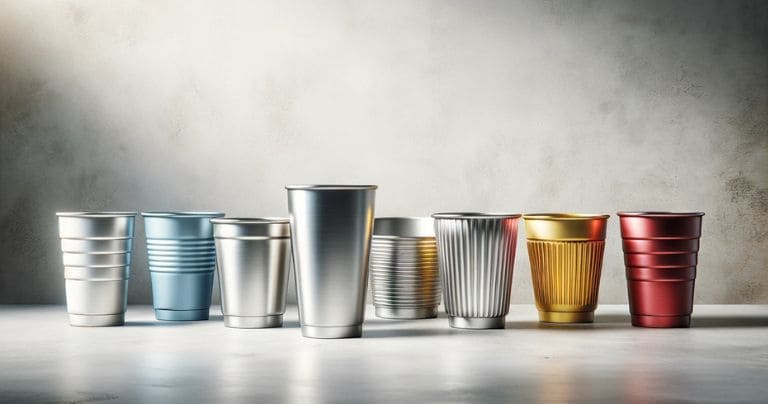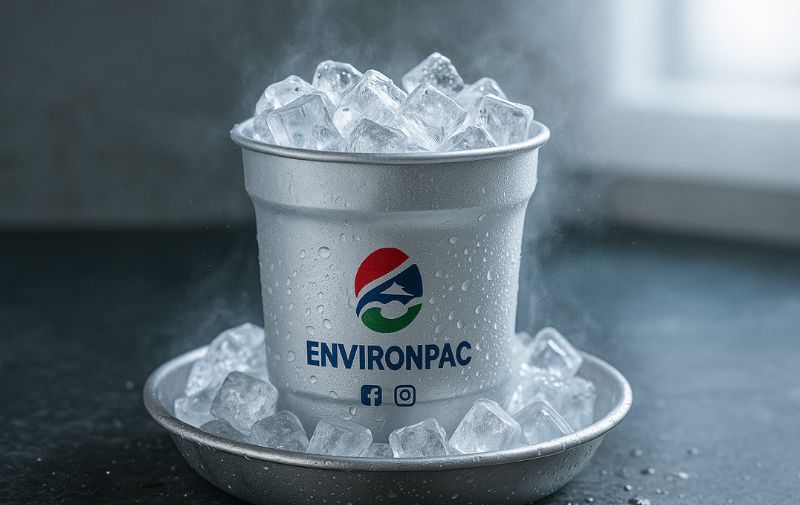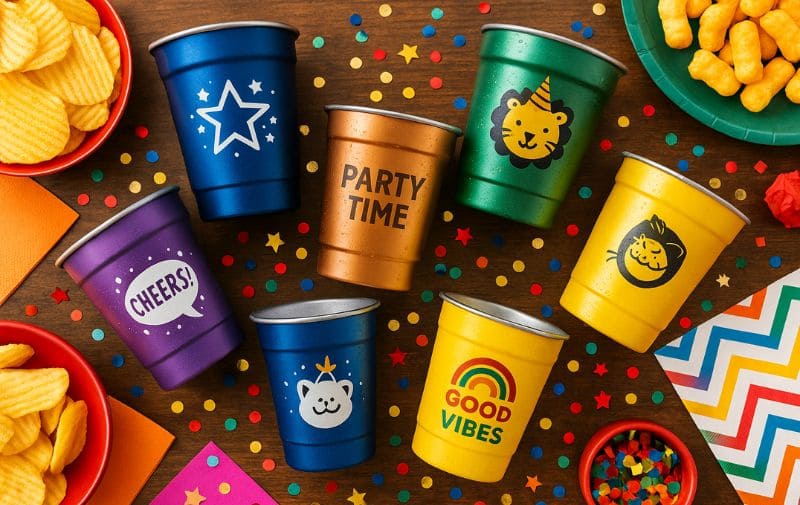Table of Contents
Exploring the safety of aluminum cups for hot beverages is a topic of growing interest, given their rising popularity. This concern is understandable and warrants an objective analysis, considering the diverse applications and materials involved in beverage containers.
Aluminum cups are a go-to choice for many, but their safety with hot beverages raises questions. With a low melting point yet higher than water’s boiling point, aluminum can safely hold hot liquids. However, the real key to safety lies in a food-grade polymer coating inside the cup.
In this post, we’ll explore this topic in depth, addressing the key concerns and questions you might have about using aluminum cups for your hot drinks. Let’s dive into the details.
What Makes Aluminum a Suitable Material for Hot Beverages?
When it comes to choosing materials for beverage containers, particularly for hot drinks, aluminum stands out for several reasons. Understanding why can help you make an informed decision about whether aluminum cups are the right choice for your hot beverage needs.
Excellent Heat Conduction
Aluminum’s ability to conduct heat efficiently is one of its most significant advantages. Unlike some materials that might unevenly distribute heat, leading to hot spots, aluminum ensures that the temperature of your beverage is consistent throughout. This uniform heat distribution is not just about comfort; it’s also about safety, reducing the risk of burns from unexpectedly hot areas on the cup.
Durability and Longevity
Another key factor in aluminum’s favor is its durability. Aluminum cups can withstand the rigors of daily use without suffering from the cracks or breakages that glass or ceramic might. This resilience makes them a long-lasting option, ideal for settings where cups need to endure frequent handling or the occasional drop.

Lightweight and Portable
Aluminum’s lightweight nature is a boon for those who are always on the go. Whether it’s for a camping trip, a picnic, or just daily commuting, aluminum cups are easy to carry, adding convenience without sacrificing the quality of your hot drink experience.
Safety Considerations
When talking about hot beverages, the safety of the material is paramount. Aluminum’s melting point is much higher than the boiling point of water, making it a safe option for hot liquids. However, the true key to safety lies in a quality food-grade polymer coating inside the cup. This coating acts as a barrier, ensuring that there is no direct contact between the beverage and the metal, thereby preventing any chemical reactions or leaching.
Eco-Friendly and Sustainable
In today’s environmentally conscious world, the sustainability of the materials we use is increasingly important. Aluminum scores well in this regard too. It is 100% recyclable, meaning that aluminum cups can be repurposed at the end of their life cycle without losing quality or purity. This recyclability positions aluminum as a more eco-friendly option compared to single-use or less durable materials.
In summary, aluminum’s suitability for hot beverages comes down to its excellent heat conduction, durability, lightweight nature, safety with proper coating, and environmental sustainability. These factors make aluminum cups a versatile, safe, and responsible choice for enjoying hot drinks, whether at home or on the move.
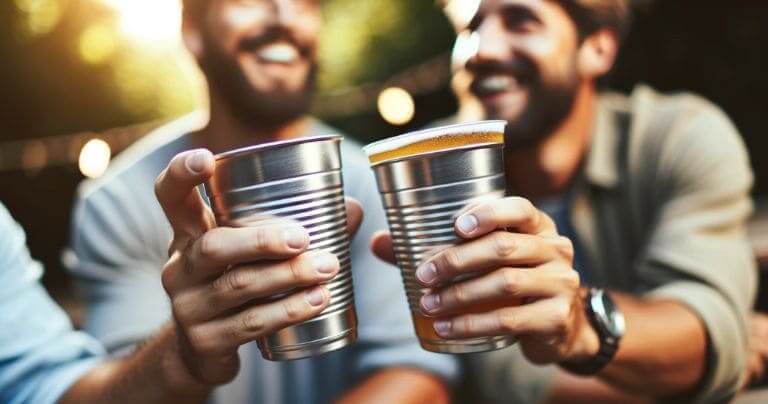
How Does the Food-Grade Polymer Coating Enhance Safety?
When considering reusable aluminum rcups for hot beverages, an essential feature often comes into play: the food-grade polymer coating. This coating is not just an additional layer; it’s a crucial component that significantly enhances the safety and usability of the cups. Understanding its role will help you appreciate why it’s a vital aspect of high-quality aluminum cups.
Barrier Against Metal Leaching
The primary role of the food-grade polymer coating is to act as a protective barrier between the beverage and the aluminum. This is especially important for hot beverages, which can potentially cause leaching of metal into the liquid. The polymer coating ensures that your drink remains free from any metallic contamination, maintaining its purity and taste.
Preventing Chemical Reactions
Aluminum, though safe and durable, can react with certain acidic or alkaline beverages. Over time, this reaction could degrade the quality of the cup and even alter the flavor of your drink. The polymer coating prevents such chemical reactions, ensuring that the integrity of both the cup and the beverage is preserved.
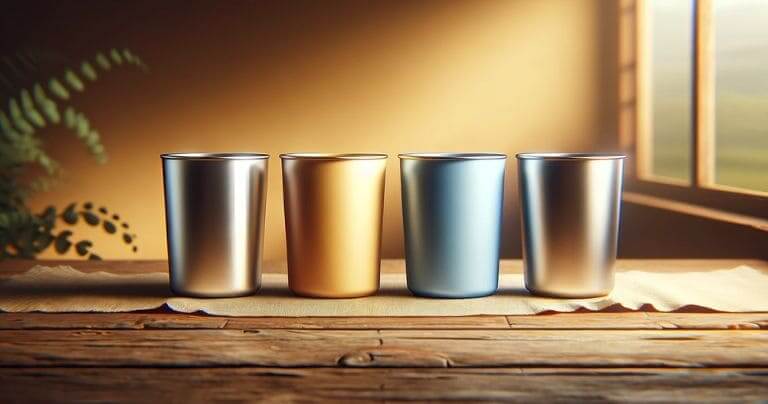
Enhancing the Durability of the Cup
In addition to preventing metal leaching and chemical reactions, the coating also contributes to the overall durability of the cup. It helps protect the aluminum from corrosion, scratches, or wear and tear, which can occur over time with regular use. This means your aluminum cups remain in excellent condition, serving you well over many uses.
Safe for Health
The safety of materials used in food and beverage containers is a paramount concern. Food-grade implies that the polymer coating is safe for contact with food and beverages, adhering to strict health standards. It doesn’t release harmful chemicals when exposed to hot liquids, ensuring that your health is not compromised while enjoying your hot drink.
Improving User Experience
Beyond safety, the polymer coating can enhance the overall user experience. It can make cleaning the cups easier and prevent staining or residual flavors, which is a common issue with uncoated metal cups. This means each beverage you enjoy from the cup is as fresh and enjoyable as the last.
In summary, the food-grade polymer coating in aluminum solo cups is more than just a safety feature; it’s a testament to quality and commitment to consumer well-being. It enhances the cup’s durability, maintains the beverage’s integrity, and ensures a safe and enjoyable drinking experience. When selecting aluminum solo cups, especially for hot beverages, ensuring the presence of this coating is key to getting the most out of your drinkware.

What Are the Health Implications of Using Uncoated Aluminum Cups?
In the diverse world of beverage containers, understanding the health implications of the materials we use is crucial. This is particularly true for uncoated aluminum cups, which are becoming increasingly popular. While aluminum is generally considered safe, the lack of a protective coating in some cups raises questions about their long-term health implications.
Potential for Metal Leaching
One of the primary concerns with uncoated aluminum cups is the possibility of metal leaching into beverages. When aluminum comes into direct contact with hot or acidic liquids, there’s a potential for tiny amounts of metal to dissolve into the drink. Although the amount is typically very small, regular consumption over time could lead to a noticeable accumulation of aluminum in the body.
Understanding Aluminum’s Impact on Health
Aluminum is the most abundant metal in the Earth’s crust and is naturally present in our food and environment. The human body is accustomed to small amounts of aluminum. However, excessive intake can pose health risks. Studies have suggested that high levels of aluminum exposure may be linked to certain health issues, although the relationship is not entirely clear and is often a subject of ongoing research.
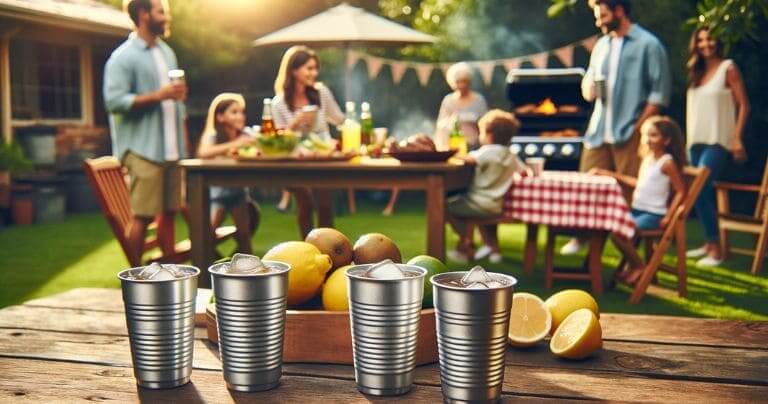
Risks with Acidic Beverages
The risk of aluminum leaching increases with the acidity of the beverage. Drinks like coffee, tea, and citrus juices can exacerbate the leaching process, potentially leading to higher levels of aluminum intake than expected. This is an important consideration for those who regularly consume such beverages from uncoated aluminum cups.
Importance of Food-Grade Coatings
This potential health concern highlights the importance of choosing reusable aluminum cups with a food-grade polymer coating. These coatings act as a barrier, preventing any direct contact between the beverage and the aluminum, thereby significantly reducing the risk of leaching.
Making an Informed Choice
While occasional use of uncoated aluminum cups might not pose a significant health risk, being informed about the potential implications is crucial. For those concerned about long-term exposure, opting for coated aluminum cups, especially for hot or acidic drinks, is a wise choice. It ensures you can enjoy your beverages without worry, knowing that your health is not at risk.
In summary, while uncoated aluminum cups are generally safe, understanding their potential health implications is essential. Considering the possibility of aluminum leaching, particularly with certain types of beverages, opting for coated aluminum cups offers an extra layer of safety. It’s all about making informed choices to ensure that your drinking experience is not just enjoyable but also safe for your health.
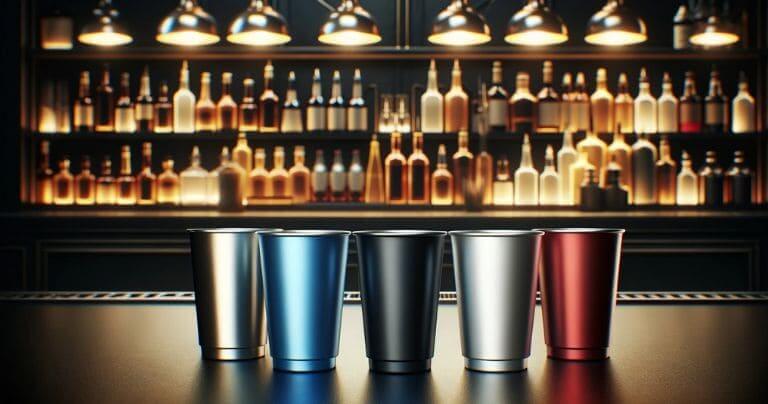
Are There Any Environmental Benefits to Using Aluminum Cups for Hot Beverages?
In a world increasingly conscious of environmental sustainability, the choice of materials for everyday items like beverage containers becomes significant. Aluminum solo cups, particularly for hot beverages, have risen in popularity, but it’s worth exploring: do they offer any environmental benefits?
Recyclability and Sustainability
The most compelling environmental benefit of aluminum cups is their recyclability. Aluminum is one of the most recyclable materials on the planet. Unlike some other materials that degrade in quality after recycling, aluminum can be recycled indefinitely without losing its integrity. This means that when you use an aluminum cup, you’re contributing to a cycle that requires less raw material extraction and reduces waste.
Energy Efficiency in Recycling
The process of recycling aluminum is also much more energy-efficient compared to producing new aluminum. It’s estimated that recycling aluminum saves around 95% of the energy required to make the same amount of aluminum from its raw form. By choosing aluminum cups, you are indirectly supporting an industry that significantly reduces energy consumption and greenhouse gas emissions.

Durability Reduces Waste
Another environmental advantage of aluminum cups is their durability. They are far more robust than disposable or even some reusable alternatives. This longevity means fewer resources are used over time, as there’s less need for replacement. A durable, reusable aluminum cup can replace hundreds, if not thousands, of single-use cups over its lifetime.
Lightweight Nature Aids in Transportation
Aluminum’s lightweight quality also contributes to environmental benefits, particularly during transportation. Lighter loads mean lower fuel consumption and reduced carbon emissions during shipping. This aspect makes aluminum an eco-friendlier option compared to heavier materials.
Considerations Beyond the Material
While aluminum itself is environmentally friendly, the sustainability of aluminum cups also depends on other factors, like the manufacturing process and the source of the aluminum. Ethically sourced aluminum, combined with environmentally responsible manufacturing practices, enhances the overall eco-friendliness of the cups.
A Holistic View of Environmental Impact
To truly assess the environmental benefits of using aluminum cups for hot beverages, it’s important to take a holistic view. This includes considering the entire lifecycle of the cup – from the extraction of raw materials to manufacturing, use, and eventual recycling. When all these factors are considered, aluminum cups emerge as a sustainable choice, helping to reduce waste and conserve resources in the long run.
In summary, aluminum cups offer several environmental benefits, making them a sustainable choice for hot beverages. Their recyclability, energy efficiency in recycling, durability, and lightweight nature contribute to their eco-friendly profile. By choosing aluminum cups, you’re not only making a choice for your convenience and safety but also for the health of our planet.

How Do Aluminum Cups Compare with Other Materials for Hot Beverages?
In the quest to find the perfect cup for hot beverages, various materials from glass to paper are considered. Aluminum cups, however, have sparked interest for their unique qualities. But how do they stack up against other materials? Let’s compare and see which material might be best suited for your hot drink preferences.
Aluminum vs. Glass
Glass is a classic choice known for its purity and ability to maintain the taste of the beverage. However, aluminum offers advantages that glass can’t match. It’s far more durable, meaning less risk of breakage. Aluminum is also lighter, making it more portable and practical for on-the-go use. While glass can provide a more aesthetic appeal, aluminum wins in terms of practicality and durability.
Aluminum vs. Ceramic
Ceramic cups have been the traditional go-to for hot beverages. They are excellent in retaining heat but can be heavy and fragile. Aluminum, in contrast, is lightweight and unbreakable. Although ceramic may hold heat a bit longer than aluminum, the latter’s durability makes it a more versatile and long-lasting option, especially for outdoor activities or daily commuting.
Aluminum vs. Plastic
Plastic is another common material, but it falls short in several areas compared to aluminum. While some plastics can retain heat well, they aren’t as eco-friendly, even when reusable. There’s also the concern of chemicals leaching at high temperatures. Aluminum, being recyclable and safe with a food-grade coating, offers an environmentally friendlier and safer option.
Aluminum vs. Paper
Paper cups are convenient for their disposability but are not environmentally sustainable for long-term use. They also don’t insulate heat as effectively as aluminum. With the added need for a protective sleeve for handling, paper cups can be less efficient overall. Aluminum, being reusable and offering good heat retention, stands out as a more sustainable and practical choice.
Aluminum vs. Stainless Steel
Stainless steel is another popular choice for hot beverages. Like aluminum, it is durable and good at heat retention. The choice between the two often comes down to personal preference regarding taste and mouthfeel, as some people might perceive a metallic taste from stainless steel.
Aluminum Solo cups present a compelling case when compared to other materials for hot beverages. They strike a balance between durability, eco-friendliness, and practicality. While each material has its unique benefits, aluminum stands out for its combination of lightweight portability, environmental sustainability, and safety with a food-grade coating. It’s a versatile choice that caters to a range of preferences and lifestyles.
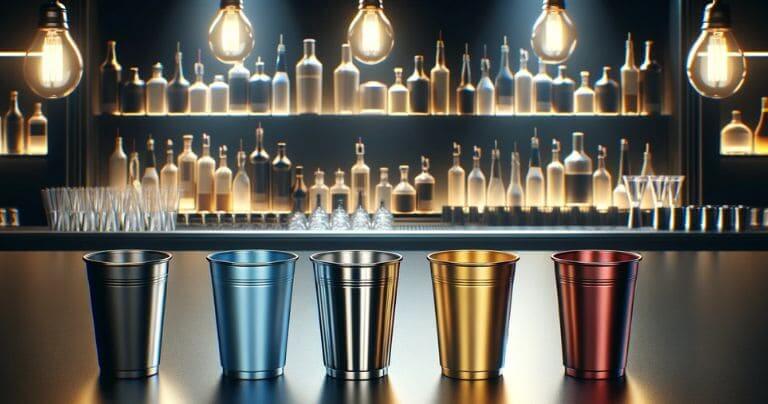
Conclusion
In conclusion, aluminum cups are a safe and practical option for hot beverages, provided they come with a food-grade polymer coating. Their efficiency in heat distribution, durability, and eco-friendliness make them a superior choice in many scenarios. When selecting aluminum cups, ensure they meet safety standards and consider the environmental benefits they offer over other materials.

